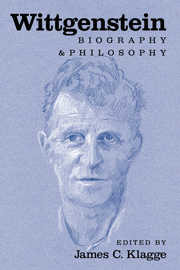Book contents
- Frontmatter
- Contents
- Contributors
- Editor's Preface
- Biography and Philosophy
- Wittgenstein
- Wittgenstein and the Mind's Eye
- Deep Disquietudes: Reflections on Wittgenstein as Antiphilosopher
- The Sleepy Philosopher: How to Read Wittgenstein's Diaries
- Letters from a Philosopher
- Wittgenstein and Reason
- Wittgenstein and the Idea of Jewishness
Wittgenstein and the Idea of Jewishness
Published online by Cambridge University Press: 27 March 2010
- Frontmatter
- Contents
- Contributors
- Editor's Preface
- Biography and Philosophy
- Wittgenstein
- Wittgenstein and the Mind's Eye
- Deep Disquietudes: Reflections on Wittgenstein as Antiphilosopher
- The Sleepy Philosopher: How to Read Wittgenstein's Diaries
- Letters from a Philosopher
- Wittgenstein and Reason
- Wittgenstein and the Idea of Jewishness
Summary
Wittgenstein, in a confessional phase, reproached himself bitterly for having minimized his Jewish ancestry. Yet he was right to minimize it, if a correct impression of his family and its influence on him was the aim. No one at the turn of the century would have thought of characterizing that large cousinhood as a Jewish family, as it is occasionally described today. Karl Menger, who knew them and was a particular friend of Wittgenstein's Aunt Clara, comments, that insofar as there was any difference between Jewish and non-Jewish households, they seemed to belong rather to the latter.
They (Ludwig's parents and his uncles and aunts and their children after them) were Protestant or Catholic and married to Protestants or Catholics. Theirs was not a life with any Jewish dimension, or consciousness of their remote Jewish ancestry, a diminishing proportion in any case as the generations passed. Nor did they live among, consort with, or feel a special affinity for other families with a Jewish element in their background. Such a possibility did not really exist in the Christian circles to which they did belong, since Jewishness as a family characteristic vanished on conversion and intermarriage: often only a name remained, on the male side.
Ludwig himself came at the intersection of two such families, since Karl alone of that generation married one whose father had Jewish ancestors. The result still is that, of Ludwig's three grandparents, only one was herself demonstrably a member of the Jewish community, in, as it happens, Vienna, and her marriage – her marriage out, so to speak – was registered there as well as in Dresden, where it actually took place.
- Type
- Chapter
- Information
- WittgensteinBiography and Philosophy, pp. 221 - 236Publisher: Cambridge University PressPrint publication year: 2001
- 5
- Cited by

